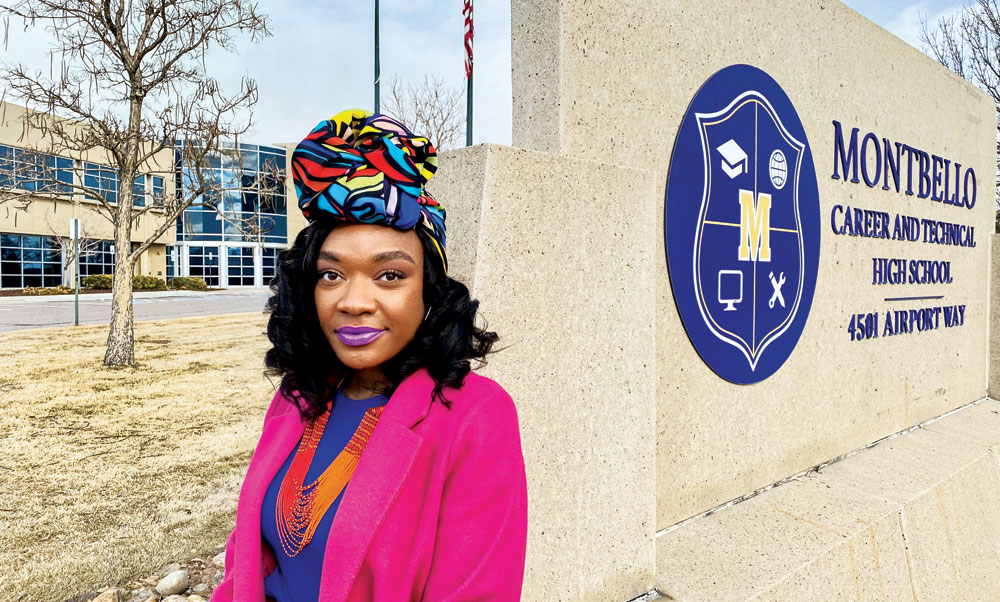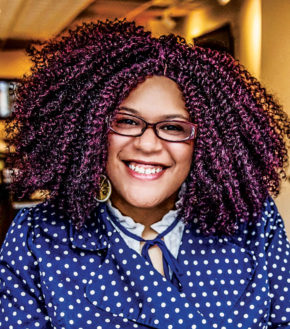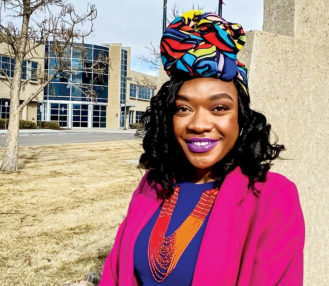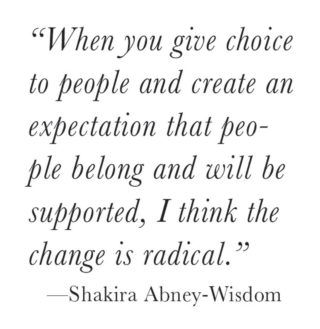

Regan Byrd is an anti-oppression, anti-racism, speaker and consultant.
Having experienced learning in both majority white and majority people-of-color spaces, tears start to form in Shakira Abney-Wisdom’s eyes as she reflects on the value of belonging. “I just think about the spaces where the expectation is that I would be my full self, versus the expectation that I would erase components of who I am to assimilate to what that space is. I am really excited to create a space where my kids and my teachers get to be their full selves.”
The passion Abney-Wisdom, principal of the newly created Robert F. Smith STEAM Academy in Montbello, feels for her community is evident. Clad in a vivid purple dress, an orange and red necklace that looks like a sunset, and a rainbow headscarf, she exudes the same passion about the power of the HBCU (Historically Black Colleges and Universities) model for the new DPS high school—a model that is especially significant for students’ sense of self-worth and belonging.
The new school is named after East High School graduate Robert F. Smith, who is a Black American investor, inventor, engineer, philanthropist, and entrepreneur. “Modeled after Historically Black Colleges and Universities (HBCUs), with a comprehensive approach that incorporates science, technology, engineering, art, and math,” according to Denver Public Schools’ literature, it adds to the slate of options DPS offers to its students. Like other HBCU style institutions, Robert F. Smith STEAM Academy centers Black/African-American culture and history throughout its design: curricula, educator background and expertise, professional development opportunities, and even school celebrations.

Principal Shakira Abney-Wisdom will open DPS’ first Historically Black Colleges and Universities (HBCU) model high school in the fall. It is named after East High School graduate Robert F. Smith, engineer, philanthropist and entrepreneur.
One of the most striking aspects of the school is its interdisciplinary approach to curriculum. Students may be reading a poem in art class that is thematically tied to a text being discussed in English class. Or students may learn about scientific racism and the history of medical experimentation on the black community in history class, and have that tied a real world example in the story of Henrietta Lacks in biology. Content is approached holistically, and topics from one subject flow into the next to give students opportunities to make connections and find insights—as well as to empower decision-making that involves multiple variables or truths. Abney-Wisdom cites the example of a clothing store purchase, which involves not only cost considerations, but consideration of one’s personal style, clothing already owned, seasonality, etc. “How we move in the world should have an analogous process in the way we learn,” she posits.
HBCUs have operated in the United states for over 180 years, and the vast majority of them emerged following the Civil War to provide Black Americans with educational opportunities denied to them during enslavement and in segregated educational systems. In many ways, the creation of these colleges and universities highlights the tenacity and resilience of the Black community through unspeakable hardship. Creating pathways to education, employment, and empowerment where none previously existed, often in the face of active opposition and sabotage, is a running theme in African-American history. HBCU’s have a long, lesser-known history of inclusive practices and diversity, notably welcoming many Jewish academic faculty during the 1940s as they were fleeing Nazi rule in Germany. Today, 1 in 4 students enrolled at an HBCU is non-Black.
 The HBCU model is not just about empowering African-American students and faculty by providing spaces focused on their historical and cultural experiences, it is about what we can all learn and gain from Black history and narratives. Understanding American culture, history, art, literature, etc., through a Black lens offers all American students complex ways to understand themselves and their communities and to navigate the world.
The HBCU model is not just about empowering African-American students and faculty by providing spaces focused on their historical and cultural experiences, it is about what we can all learn and gain from Black history and narratives. Understanding American culture, history, art, literature, etc., through a Black lens offers all American students complex ways to understand themselves and their communities and to navigate the world.
Families and students who are interested in enrolling can begin the process by submitting an intent to enroll form. For more information visit: https://www.dpsk12.org/hbcu-steam-high-school/
Regan Byrd is an anti-oppression speaker, trainer, activist and consultant, specializing in anti-racism and anti-sexism. www.reganbyrdconsulting.com


0 Comments